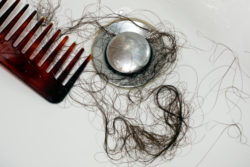 Women who undergo chemotherapy for treatment of breast cancer are aware that they will likely undergo breast cancer hair loss while being treated. They also expect that, though the process of losing their hair will likely be a difficult one, it will be temporary in nature.
Women who undergo chemotherapy for treatment of breast cancer are aware that they will likely undergo breast cancer hair loss while being treated. They also expect that, though the process of losing their hair will likely be a difficult one, it will be temporary in nature.
Breast cancer sufferers expect that their hair will grow back after a few months of having completed their chemotherapy regimen.
Plaintiff Susan T. of Louisiana is no different. She thought her breast cancer hair loss would be temporary after chemotherapy. However, after receiving docetaxel as her chemotherapy agent (which is also known under the brand name Taxotere) from September 2012 to November 2012, she says she suffered from permanent breast cancer hair loss.
While docetaxel is used to treat other cancers as well, it appears to be most commonly used to treat women with breast cancer patients. Taxotere and similar chemotherapy drugs are derived from plants, and the agents are known as taxanes.
Taxotere was initially approved by the FDA in May 1996 “for the treatment of patients with locally advanced or metastatic breast cancer after failure of prior chemotherapy.” The lawsuit states that after it completed self-sponsored clinical trials, the makers of the drug “claim superiority over other chemotherapy products approved to treat breast cancer.”
The Taxotere lawsuit claims, however, that not only were its claims of superiority not true, the makers of the drug did not disclose the additional complications linked with the use of the docetaxel. Additionally, the breast cancer hair loss lawsuit states that the drug manufacturers went out of their way to purposely cover up the relationship between docetaxel use and permanent breast cancer hair loss in the United States.
Patients and physicians in Europe and in Canada were apparently warned before patients and physicians in the U.S. that permanent breast cancer hair loss, or alopecia, was a potential side effect of the chemotherapy treatment. The Taxotere lawsuit states that the makers of docetaxel knew there was an increased risk of breast cancer hair loss with the chemotherapy drug, but did not warn patients in the U.S. of this risk until December 2015.
Susan has raised a number of counts against the defendants named in her lawsuit including strict products liability for failure to warn, strict products liability for misrepresentation, negligence, negligent misrepresentation, fraudulent misrepresentation, fraudulent concealment, fraud and deceit and breach of express warranty. She has also raised a claim under Louisiana’s redhibition law, which is similar to a “lemon law” in other states.
Susan’s request for damages is not specified in her short complaint, but most women who go on to file a breast cancer hair loss lawsuit request similar compensation. Typical lawsuits over breast cancer hair loss seek damages related to medical expenses, pain and suffering, physical disfigurement, mental anguish, emotional distress, loss of enjoyment of life, loss of earnings and earning capacity, loss of consortium or spousal companionship and more.
Plaintiffs also often seek to be compensated for attorneys’ fees, court costs, and any pre-and post-judgment interest that accrues. In addition, punitive damages are also requested to sufficiently punish the defendants in order to deter them from engaging in the allegedly improper behavior that was outlined in the case.
The Permanent Breast Cancer Hair Loss Lawsuit is Case No. 2:17-cv-05575-KDE-MBN and is part of the Taxotere MDL In re: Taxotere (Docetaxel) Products Liability Litigation, MDL No. 2740, in the U.S. District Court for the Eastern District of Louisiana
Do YOU have a legal claim? Fill out the form on this page now for a free, immediate, and confidential case evaluation. The attorneys who work with Top Class Actions will contact you if you qualify to let you know if an individual lawsuit or Taxotere class action lawsuit is best for you. [In general, Taxotere lawsuits are filed individually by each plaintiff and are not class actions.] Hurry — statutes of limitations may apply.
ATTORNEY ADVERTISING
Top Class Actions is a Proud Member of the American Bar Association
LEGAL INFORMATION IS NOT LEGAL ADVICE
Top Class Actions Legal Statement
©2008 – 2025 Top Class Actions® LLC
Various Trademarks held by their respective owners
This website is not intended for viewing or usage by European Union citizens.
Get Help – It’s Free
Join a Free Taxotere Class Action Lawsuit Investigation
If you received intravenous chemotherapy treatment for breast cancer and were told that your hair would grow back but it never did, you may have a legal claim. Permanent hair loss is defined as a minimum of 6 months after the Taxotere chemotherapy treatment ended, and there is still no new hair growth. Join this free Taxotere class action lawsuit investigation now!
An attorney will contact you if you qualify to discuss the details of your potential case at no charge to you.
Please Note: If you want to participate in this investigation, it is imperative that you reply to the law firm if they call or email you. Failing to do so may result in you not getting signed up as a client, if you qualify, or getting you dropped as a client.
Oops! We could not locate your form.












